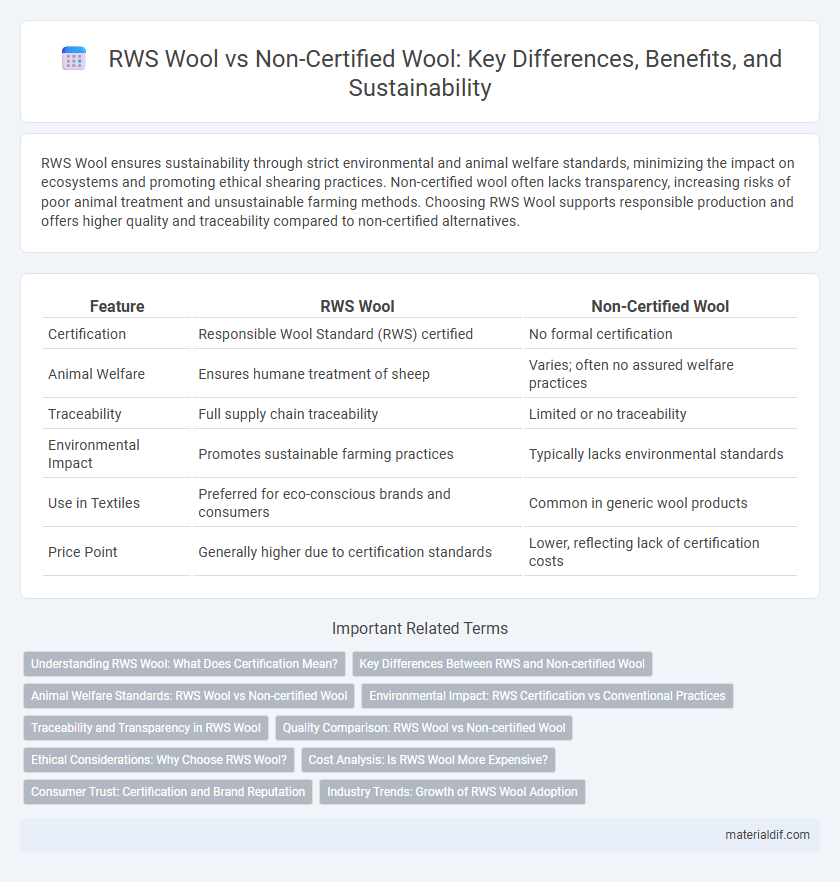RWS Wool ensures sustainability through strict environmental and animal welfare standards, minimizing the impact on ecosystems and promoting ethical shearing practices. Non-certified wool often lacks transparency, increasing risks of poor animal treatment and unsustainable farming methods. Choosing RWS Wool supports responsible production and offers higher quality and traceability compared to non-certified alternatives.
Table of Comparison
| Feature | RWS Wool | Non-Certified Wool |
|---|---|---|
| Certification | Responsible Wool Standard (RWS) certified | No formal certification |
| Animal Welfare | Ensures humane treatment of sheep | Varies; often no assured welfare practices |
| Traceability | Full supply chain traceability | Limited or no traceability |
| Environmental Impact | Promotes sustainable farming practices | Typically lacks environmental standards |
| Use in Textiles | Preferred for eco-conscious brands and consumers | Common in generic wool products |
| Price Point | Generally higher due to certification standards | Lower, reflecting lack of certification costs |
Understanding RWS Wool: What Does Certification Mean?
RWS Wool, certified under the Responsible Wool Standard, guarantees ethical sourcing with verified animal welfare, land management, and traceability from farm to final product. Non-certified wool lacks this transparency, often raising concerns about animal welfare practices and environmental impact. Understanding RWS certification empowers consumers to make informed choices supporting sustainable and responsible wool production.
Key Differences Between RWS and Non-certified Wool
RWS Wool is sourced from farms adhering to the Responsible Wool Standard, ensuring high animal welfare and sustainable land management practices, while non-certified wool lacks such verified ethical and environmental standards. RWS certification involves strict traceability, verifying the entire supply chain from farm to final product, whereas non-certified wool may involve uncertain sourcing and practices. This distinction impacts consumer confidence, ecological footprint, and the overall sustainability of wool products.
Animal Welfare Standards: RWS Wool vs Non-certified Wool
RWS Wool adheres to strict animal welfare standards, ensuring sheep are treated humanely with regular welfare audits and bans on practices like mulesing without anesthesia. Non-certified wool lacks these rigorous controls, often resulting in inconsistent animal treatment and potential exposure to inhumane practices. Choosing RWS Wool supports ethical farming, promoting sustainable and cruelty-free wool production.
Environmental Impact: RWS Certification vs Conventional Practices
RWS Wool, certified by the Responsible Wool Standard, ensures sustainable farming practices that minimize environmental impact by promoting soil health, biodiversity, and water conservation, contrasting sharply with non-certified wool produced under conventional methods that often involve intensive land use and chemical inputs. The RWS certification mandates traceability and animal welfare standards, reducing greenhouse gas emissions and land degradation associated with traditional wool production. Consumers choosing RWS Wool actively support eco-friendly practices, contributing to lower environmental footprints compared to non-certified wool alternatives.
Traceability and Transparency in RWS Wool
RWS Wool provides full traceability from farm to garment, ensuring transparent sourcing and ethical practices throughout the supply chain. Non-certified wool often lacks comprehensive tracking, making it difficult to verify animal welfare standards and environmental impact. Traceability in RWS Wool empowers consumers to make informed choices based on verified sustainability credentials.
Quality Comparison: RWS Wool vs Non-certified Wool
RWS (Responsible Wool Standard) wool guarantees higher fiber quality due to strict animal welfare and land management criteria, resulting in stronger, finer, and more consistent fibers compared to non-certified wool. Non-certified wool lacks standardized oversight, often leading to variable fiber strength, increased impurities, and potential ethical concerns affecting overall textile performance. This quality assurance in RWS wool enhances durability, softness, and sustainability, making it a superior choice for premium wool products.
Ethical Considerations: Why Choose RWS Wool?
RWS Wool is sourced from farms that adhere to strict animal welfare standards, ensuring ethical treatment and sustainable land management. Non-certified wool often lacks transparency, which can lead to practices that compromise animal well-being and environmental health. Choosing RWS Wool supports responsible farming, reduces cruelty, and promotes sustainable textile production.
Cost Analysis: Is RWS Wool More Expensive?
RWS-certified wool typically carries a higher price tag than non-certified wool due to the rigorous standards and sustainable practices involved in its production, including animal welfare and environmental impact assessments. The cost premium reflects investments in traceability, transparency, and ethical sourcing that non-certified wool often lacks. Businesses prioritizing sustainability may find the higher initial expense offset by enhanced brand value and consumer trust associated with RWS certification.
Consumer Trust: Certification and Brand Reputation
RWS Wool, certified by the Responsible Wool Standard, ensures stringent animal welfare and sustainable farming practices, significantly enhancing consumer trust compared to non-certified wool. Brands using RWS Wool leverage this certification to build a reputable image, attracting environmentally conscious consumers who prioritize ethical sourcing. In contrast, non-certified wool often lacks transparency, raising concerns about animal welfare and sustainability that can undermine brand credibility.
Industry Trends: Growth of RWS Wool Adoption
The demand for RWS (Responsible Wool Standard) certified wool is rapidly increasing due to heightened consumer awareness of ethical and sustainable fashion practices. Industry reports indicate a 25% annual growth rate in RWS wool adoption, driven by brands seeking transparency in animal welfare and environmental impact. Non-certified wool faces declining market share as regulatory pressure and retailer commitments push for certified sustainable sourcing.
RWS Wool vs Non-certified Wool Infographic

 materialdif.com
materialdif.com